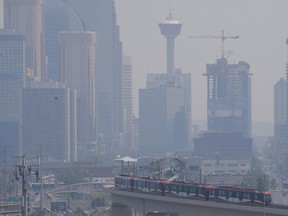Expect more frequent wildfires, smoke as climate changes, says U of A forestry prof

Article content
Albertans can expect that wildfire wheeze to become more frequent as climate change continues to feed western Canadian forest blazes, says an expert in the field.
We’re already choking back the consequences of man-made climate change that’s increasingly turning woodlands tinder dry and raising the number of lightning strikes, said Dr. Michael Flannigan of the University of Alberta.
“With climate change, we expect more fire, then there’s more smoke and we can expect more intense fires and more smoke,” said Flannigan of the years-long forecast.
That probably applies for this summer, as well, he said, with many parts of B.C. erupting into wildfires that are threatening or destroying inhabited places.
“B.C.’s busiest fire month is August, so we have a lot more fire season left,” said Flannigan. “We’ll have episodes like this into the fall unless there’s a lot of rain.”
Flannigan recently returned from B.C. fire zones while helping film an episode on the topic for the CBC TV science program The Nature of Things.
The rapidity of wildfire smoke’s travel was alarming, he said, as were the parched conditions that are perfect fuel for the blazes.
“It was incredibly hot, dry and windy and you could hear the grass crunch, crunch under your feet because it was so bone-dry,” he said.
“The smoke from the fire at Ashcroft reached Jasper while it was still burning.”
Scientists, including Flannigan, cite climate change as the reason the amount of Canadian forest burnt has doubled since the 1970s, with Alberta starting its forest fire season March 1 instead of April 1.
“Fire seasons are staring earlier and the warmer it gets, the more lightning you get,” he said, listing off a growing number of disastrous forest blazes and fire seasons throughout Canada.
“It’s helping to confirm what we’ve believed and feared.”
That heightened hazard will only stretch fire fighting resources, he added.
A small silver lining for Albertans: if the next major fire episodes are in Saskatchewan, smoke won’t be a problem, said Flannigan.
“The winds tend to blow from west to east,” he said.
on Twitter: @BillKaufmannjrn






Postmedia is committed to maintaining a lively but civil forum for discussion. Please keep comments relevant and respectful. Comments may take up to an hour to appear on the site. You will receive an email if there is a reply to your comment, an update to a thread you follow or if a user you follow comments. Visit our Community Guidelines for more information.